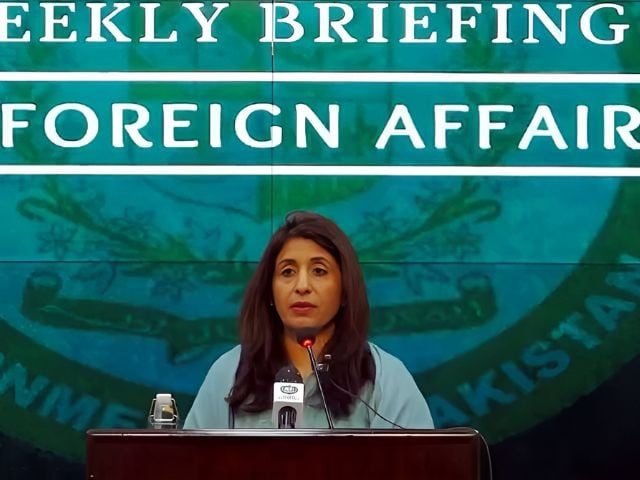Despite being acquitted or granted bail in many cases, he continues to face allegations related to the May 9 violence, as well as a £190 million land corruption case involving the Al Qadir University

By our correspondent
ISLAMABAD: The Foreign Office of Pakistan has expressed strong disapproval of a recent initiative by approximately 60 US lawmakers, who urged President Joe Biden to apply pressure on Islamabad for the release of former Prime Minister Imran Khan. Describing the move as “counterproductive,” spokesperson Mumtaz Zahra Baloch stated that Pakistan values its bilateral relations with the United States and advocates for constructive dialogue to address concerns.
“Comments on Pakistan’s domestic affairs are contrary to inter-state conduct and diplomatic norms,” Baloch remarked during her weekly briefing. She emphasized that such letters and statements undermine the positive dynamics of Pakistan-US relations, adding that they stem from an “incorrect understanding” of the political situation in Pakistan. The lawmakers, led by US Representative Greg Casar, wrote to Biden urging him to leverage the United States’ influence with the Pakistani government to secure Khan’s release and address alleged human rights abuses. This letter represents the first collective call from members of the US Congress regarding Khan’s situation, who has been in custody since August 2023 following his removal from office in April 2022 through a parliamentary no-confidence vote.
Khan’s party, the Pakistan Tehreek-e-Insaf (PTI), claims that the over 200 cases filed against him are politically motivated. Despite being acquitted or granted bail in many cases, he continues to face allegations related to the May 9 violence, as well as a £190 million land corruption case involving the Al Qadir University. The case alleges that Khan and his wife, Bushra, received substantial financial and land benefits for legalizing funds identified and returned by the UK during his administration.
In a related context, a UN official from Geneva raised concerns about the detention of Khan and other political prisoners in Pakistan. The Foreign Office countered these assertions, accusing the Office of the High Commissioner for Human Rights of spreading “misinformation.” Baloch criticized the UN body for drawing conclusions based on media reports and speculative analyses, urging it to focus on serious human rights violations globally, particularly where international law has been undermined.
In addition to addressing the US lawmakers’ concerns, Baloch confirmed that Pakistan was not invited to the recent BRICS meeting held in Russia. “Pakistan is not a member of BRICS,” she stated, reiterating the country’s application for membership in hopes of contributing to international cooperation and revitalizing inclusive multilateralism. Baloch concluded by expressing optimism that BRICS would consider Pakistan’s request in alignment with its commitment to fostering an inclusive multilateral framework.



